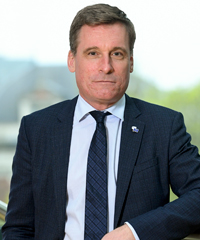By Hanna Liubakova
At the end of June, I had the honour of meeting several men and women just released from Belarusian prisons. Among them was Siarhei Tsikhanouski, husband of democratic leader Sviatlana Tsikhanouskaya, who spent over five years behind bars. He was among the first political prisoners of the 2020 uprising. His body bore marks of imprisonment, but not his spirit. I saw resilience – a man still determined to fight for dignity and freedom.
Tsikhanouski’s release, along with 13 others – including RFE/RL journalist Ihar Karnei and university lecturer Natallia Dulina – was not a gesture of goodwill. It was the result of sustained diplomatic pressure from the United States, including a rare visit by Special Envoy Keith Kellogg to Minsk. These individuals were not freed – they were expelled. Taken to the Lithuanian border, bundled in black bags, they were told to leave their homeland.
Belarus remains a prison. Nearly 1200 political prisoners are still behind bars. In 2025 alone, there have been over 1700 new political arrests and other forms of repression. These are not just numbers; they are people with families and futures. Some elderly, some seriously ill. Some, like Valiantsin Shtermer, didn’t survive. He died earlier this year in detention, denied proper medical care after suffering a stroke. Others died soon after release, worn down by inhumane conditions in jail.
This is both a legal and a humanitarian crisis. And it demands an urgent, coordinated response from the European Union.
Releasing political prisoners gives hope to the people of Belarus, who often feel forgotten. Yet the dictator continues to use human lives as bargaining chips. This is nothing new: the regime has traded political prisoners since the 1990s, since the founding of Viasna by Nobel laureate Ales Bialiatski, now again behind bars.
Some argue prisoner releases should be rewarded with eased sanctions. But listen to survivors of the regime’s prisons. ‘Lifting sanctions in exchange for hostages is like making a deal with a cannibal,’ Dulina said. Her words are hard, but necessary. Since January, 105 political prisoners have been released through pardons, while 167 new prisoners have been added to the list. This cycle is blackmail, not progress.
We must not ease pressure until all political prisoners are free and systemic repression ends.
Meanwhile, Lukashenka continues to aid the Kremlin’s war on Ukraine. Belarus hosts Russian troops and drones, produces military parts and allows Russian nuclear weapons, violating non-proliferation norms. The upcoming Zapad 2025 joint military exercises represent another provocation and threat.
But the Belarusian people have not given up. Despite propaganda and terror, they resist quietly and bravely. They learn the Belarusian language. They teach banned history. They speak the truth. Polls show that 97% of Belarusians oppose joining Russia’s war. Most oppose missile launches from Belarusian territory and hosting nuclear weapons on Belarusian soil. This is not a pro-Kremlin society – it is a society held hostage.
It is crucial to distinguish the regime from the people. Supporting civil society, media and youth initiatives is not charity – it is a long-term investment in European security.
The European Economic and Social Committee has already played a leading role, highlighting repression, supporting free media and defending the rights of the Belarusian people. We appreciate the EESC’s recent memorandum with Belarusian democratic forces. It is a meaningful gesture of solidarity and an essential recognition of the legitimacy of our struggle.
We must go further. The EU should stand firm: no sanctions relief without substantial, verifiable change. Continue to expose the regime’s crimes. Offer protection and professional opportunities to Belarusian exiles in Europe. Engage closely with democratic actors who are building alternative structures and support systems – even in exile.
Change can come swiftly. Authoritarian regimes can collapse in an instant. But we must be ready. That means keeping hope alive and standing firmly with those still imprisoned.
Belarus stands at a crossroads today. In the hands of its people, it can become a peaceful, democratic European nation. In the hands of dictators, it remains a source of instability and aggression.
Let us help tip the balance toward freedom, justice and Europe.
The first, simplest and most urgent step: demanding the release of all political prisoners.
This is not a concession. It is the beginning of everything.






















